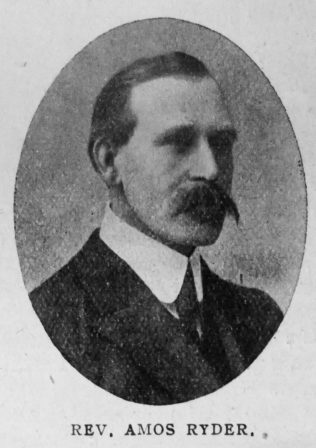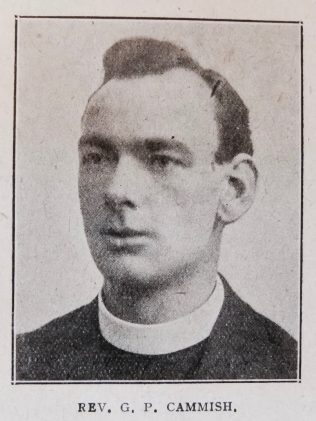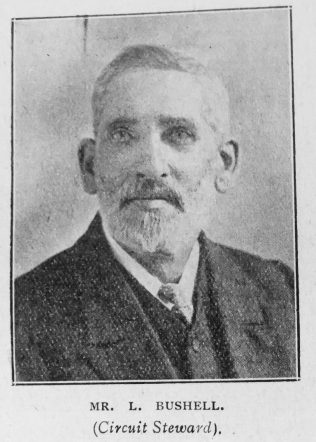Cross Keys Circuit, Monmouthshire, Wales



Transcription of Article in the Christian Messenger by Rev. Amos Ryder
It ought to be a pleasing task to describe the growth and progress of the Cross Keys Circuit, for it has a splendid record, whether we judge it by the type and quality of its members and officials or by the select and honourable place which it has filled in the religious life of the people. Few districts produce leaders of men so efficient for their special work as does the area covered by this circuit. And it is the pride of the ordinary religious workman around here to exercise a sober and restraining influence on the wilder spirits who seek to capture the miners’ lodges to propagate their own extreme views. If the formation of character be the test by which we prove the Church’s loyalty to her Master, the Cross Keys circuit need not fear the trial, for she shall be justified of her children. Were we to take out of civic life those who represent our Church in temperance, and as councillors, we do not say that progress would be arrested, but certainly the public life of this district would lose some of its masculine vigour.
But someone will say, where is this circuit? Is it in England or Wales? The only safe answer to that question is to reply: Cross Keys is in the county of Monmouth. Whatever country claims this county, to that country belongs Cross Keys – for it is situated in the beautiful Western Valley, and about eight miles west of the flourishing seaport of Newport. Coal is the staple industry, therefore most of the members are workers in the coal-mine; and on week-days they look like colliers, but on Sundays a stranger would feel at a, loss to indicate their occupation. The reason is that the men dress more like the superior artisan of the north than the ordinary men of their class, even in villages only a few miles away. As for the women, well – all the king’s horse, won’t drag me to that enterprise – for after all the ladies dress to please themselves, and my task is to deal with the origin and development of the Cross Keys Circuit.
Of course, circuits have their beginnings, for they at least are not after the order of Melchizedek. They have their birthdays and their ancestors, and while most circuits glory in their length of days, sometimes they are just a little ashamed of their ancestry; but Cross Keys Circuit knows its birthday, and is proud of its pure ecclesiastical descent.
Originally Cross Keys derived from a parent who lived over the hills and far away. In other words, the real mother of this vigorous child was the Pontypool Circuit. Now Pontypool in those days provided no taxis for its preachers, nor was the railway of much service for Sunday work. Yet earnest men climbed steep mountains, risking life itself when overtaken by a fog, because it was considered an honour to be a preacher, and because they were all aglow with the gospel they delighted to preach; and, probably because the day’s work took something out of them, there were few disappointments on the Sunday. Not many of the old brigade are now living, but we have often heard that old veteran, Lorenzo Bushell, relate thrilling tales of the fights they used to have with the enemy of man’s soul. Happy were the ancient men to belong to Pontypool, but this pleasant relation was broken off by a request, which really was a command from the missionary authorities in London. The order was to the effect that they should leave their mother and help another aspiring family to build up a happy home of their own.
So, because Cross Keys folk are characterised by loyalty to the Connexion, they said goodbye to Pontypool in the year 1871, and threw in their lot with Newport, which until then had been under the control of the Home Missionary Committee. This union lasted for thirteen years which were marked by great activity, so great, that the Cross Keys people decided they were strong enough and wise enough to set up house for themselves. And it was so.
In the year 1884 Cross Keys circuit was formed with the Rev. Enoch Ball for Superintendent Minister; and this distinguished brother was destined to become a mighty influence in the South Wales District. The new circuit started with four churches, namely, Cross Keys, Risca, Abercarn, and Ynysddu.
Now it is no easy matter finding a suitable name for a baby. Many people will rejoice at a birth and afterwards quarrel at the christening. Perhaps quarrel is too strong a word, so let us say they strongly press a preference of their own. Tell it not in Gath, but we sometimes think that our excellent Risca friends wonder why their name was not given to the new circuit. Certainly Risca is the oldest society, and they could have quoted the example of our Wesleyan friends who called the circuit after Risca. One thing is evident: if Risca fought and lost, it would not be due to lack of persistence or an inability to argue their case, for this church has always been characterised by a strong instinct of self-preservation, and we cannot do better than devote a paragraph to some of its outstanding men and women.
As far back as 1846 we find a chapel at Risca. It was a very plain building, situated on the right bank of the river and quite close to Risca colliery. We have called it a plain building, but it was dear as the apple of the eye to that single-minded band of worshippers, and for twenty happy years a mighty work of God was wrought in that barn-like building. But, after all, it is the presence of God that matters, for an intense religion thinks more of character than ritual, and the vision of the unseen more than compensates for the absence of stained glass windows, especially when they are regarded as the symbols of superstition. In any case the work prospered, and increasing numbers compelled them to enlarge the Chapel. This was done in 1867, and for the following quarter of a century the members retained their characteristic qualities, finding in an aggressive religion abundant exercise for their gifts. For forty-five years our people worshipped God on the bank of the river; and in the autumn of 1891 there came a mighty ?ood which worried its way under the foundations of the chapel, and when the members awoke next morning they found themselves homeless and confronted with the task of building a new church.
But we must not leave the old chapel without paying homage to a man whose praise is in all the churches. As guide, counsellor and friend, Risca was fortunate in having such a Christian gentleman as “Jonah Sage,” the father of the Rev. Bert Sage, now stationed at Old Leake, in Lincolnshire. His characteristic quality was a strong grip on the essentials of the Christian religion. As local preacher and class leader he exercised the authority of a bishop, but it was the authority of character not of office, and the people heard him gladly because he adorned the Gospel which he preached.
The last surviving link with the past is Mrs. Evans, better known as Selina by those who cherish her worth. For fifty-six years she has been a member of our Risca church, and, although now feeble and afflicted with deafness, she has no greater joy than in encouraging her children to honour the church, and in this she has seen her heart’s desire realised. Her three sons are devoted officials in the church, and her youngest daughter carries on the family tradition of service.
Probably the best known man of this generation is Mr. Tom Pritchard. J.P., for he is society steward, school superintendent, and choir-master. Originally an official and respected leader of the miners, he now is the secretary of the South Monmouth District of Recbabites, which office he fills with great distinction and success. As a councillor he is an enthusiast on the housing question, and at the last election was easily first among those chosen for the council. In debate he is characterised by great subtlety and persistence. He is almost certain to be chosen for high office In the Rechabite movement. Though living at Cross Keys his heart and brain dwell at Risca, which has done so much for him.
After the destruction of the old chapel by the flood, a new site was secured large enough to meet the needs of future generations. Here, in 1911, was built an up-to-date school, well supplied with class-rooms, and able to seat about four hundred people. And it speaks well for the generosity and zeal of our Risca people, that while the original cost was £2,000 the present debt only amounts to £345. When this is cleared off, who knows but what the same zeal will complete the scheme by building a chapel worthy to mark the close of one era, and to inaugurate another term of Christian Service?
Compared with the antiquity of Risca, Cross Keys may be called a very modern place. Only a few houses were built when Risca sent a zealous band to mission the hamlet. Their chief difficulty was to find a room in which to hold religious services. They settled at last in the upper room of the Cross Keys Hotel, and there they stayed until 1884, when a chapel and school were built in what was then called Pandy Lane, but which now rejoices in the proud designation of Gladstone Street. The proud chapel stood alone among the fields; now it basks in a respectable society, and occupies the best position in the main thoroughfare of the town.
We still worship in the original chapel, but the small school-room at the back soon became too small for the large numbers of scholars, so a site was secured contiguous to the chapel, and in 1911, during the successful ministry of the Rev. D.S. Lees, there was built one of the best equipped Sunday schools in our Connexion. The chapel is out of debt, but on the new school there remains a debt of £1,200. But, as the school is also the chief public hall of the district, a certain revenue is assured from the letting of it for public meetings and concerts. The whole block makes an imposing appearance, and for once our church can boast of having a place in the sun.
The two oldest surviving members are both ladies, namely, Mrs. Garland, aged ninety-five, and Mrs. Sage, who is well past her eighty-fifth birthday. The latter is the widow of Hezekiah Sage, brother of Jonah Sage, but quite a different kind of man. Both the brothers were local preachers, but if Jonah was serious, his brother could at times be hilarious. Great was the loss when this mighty man of God was taken from us. The family is now represented by Hezekiah’s son Joseph, whose daughter is an active worker in school and church.
No account of Cross Keys would be complete without an honourable mention of Mr. Lorenzo Bushell, for over forty years a class leader and local preacher, and for the last twenty-three years circuit steward of the Cross Keys Circuit. His deepest joy is to work in harmony with his superintendent minister. He never seeks the lime-light, for his temperament is shy and reserved. He has celebrated his jubilee as a member of our church, and on that occasion he presented to the church a beautiful communion service.
Next to Cross Keys and Risca, we must speak of our church at Abercarn. We have been in that district for forty-three years. During that time the church has had its share of changes. The severest blow was the explosion at the Abercarn Colliery when quite half of the members lost their lives or removed from the district. The circuit owes a debt of gratitude to the gallant few who have carried on in the spirit of faith.
For many years the leader at Abercarn was Joseph Booth. After his decease, his son, Mr. E. Booth, took up the work, and words cannot do justice to the lifelong loyalty of this true servant of our church. Among his other services is his work as secretary for the junior section of Rechabites. Other notable workers are T. Smith, E. Case and J. Davies. The chapel is out of debt, and they need a new school, but unfortunately the present site is all taken up by the chapel.
We have mentioned the three oldest societies. It now remains to speak briefly of the three youngest. The first, in order of time is Ynysddu. Here we have only a small society which labours among a very mixed population. Although we have been there more than twenty years, we still worship in a small corrugated building. When things settle down we hope to see a change for the better.
After Ynysddu comes Crumlin. Twenty years ago Crumlin was under the control of the Home Missions, and all along it has been indebted to the strong family bond existing among the members. We have there several cultured laymen who are able to supply any pulpit with thoughtful preaching. The services of the two brothers, Charles and Albert Adams, are worthy of special mention, nor should we omit the name of W.J. Morris, or that of Isaac Rogers, the society steward. We have a good Site, but unfortunately no room for future development. The present chapel is out of debt, and they are working to raise funds to build a new one.
The youngest society is at Wattsville. This cause was started in 1911, when a school was built at a cost of £1,300, and the present debt is just under £700. We have two devoted officials in the brothers Frank and Owen Coles, and we hope to see Wattsville become a blessing to the people and an asset to the Cross Keys Circuit.
My space will not allow me to say much more; but, in closing let me speak of the general outlook and of the future prospect of the circuit. To begin with the ministers. After a long experiment with one minister and a hired layman, there are now two ministers, myself, and my esteemed colleague, the Rev. G. P. Cammish. Of course this means a great increase in the expenses of the circuit, but should we retain our present hold on the population it ought to be possible to keep this circuit in the first rank. The only weakness is due to the dislike of the people to the little necessities of the circuit system. They would like the minister every Sunday, but in this respect they are not singular. The officials compare favourably with the best parts of our Connexion. The total debt of the circuit is only £2,300.
Respected in the South Wales District, and esteemed by the leading preachers of our Church, there should be a great future for this circuit if the present members will accept the challenge of the age, and utilise their resources for the extension of the Kingdom of God.
References
Christian Messenger 1920/218





No Comments
Add a comment about this page